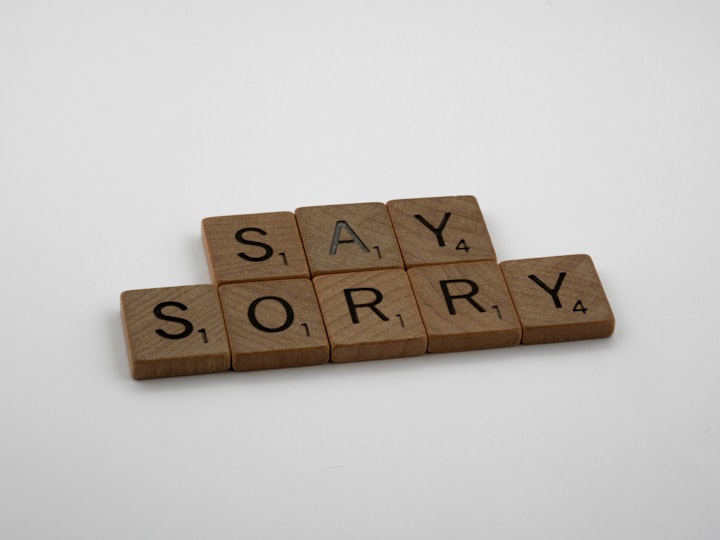Apologize in Relationships-Why You Should Do It
Knowing when and how to apologize can help!

Statements of regret can be a significant method for repairing relational connections, however having convoluted sentiments about them is likewise ordinary. A few of us had to apologize as kids when we hurt somebody, and a few of us apologized openly and felt much improved subsequent to doing as such. Certain individuals feel disgraced by saying 'sorry' while others feel embarrassed until we have done as such.
While a well known film from many years prior pronounced that "Adoration implies never saying you're grieved," never saying 'sorry' in a relationship is a certain method for gambling losing it.
This article investigates why saying 'sorry' is significant and how to perceive when you ought to say you're grieved. It likewise talks about why saying 'sorry' can be so troublesome and ways to make it simpler and more powerful.
Advantages of Saying 'sorry'
We might have found out about saying 'sorry' when we've harmed a companion — incidentally etc. There are a few significant justifications for why saying 'sorry' is essential when social principles have been disregarded. A portion of the beneficial things that come from a true expression of remorse:
Saying 'sorry' lays out relationship rules: When you've disrupted a guideline of social direct — from slicing in line to overstepping the law — restores that you know what the "rules" are and concur that they ought to be maintained. This encourages others realizing you concur that frightful conduct isn't alright.
Saying 'sorry'- restore nobility for those you hurt: Telling the harmed party that you realize it was your shortcoming, not theirs, assists them with feeling improved, and it assists them with hiding any hint of failure.
Saying 'sorry' helps fix connections: By getting individuals talking once more, a statement of regret causes them to feel alright with one another once more. It likewise conveys the worth that you put on the relationship.1
Saying 'sorry' repairs trust: An earnest conciliatory sentiment permits you to tell individuals you're not pleased with what you did, and will not be rehashing the behavior.2 That tells individuals you're the sort of individual who is by and large cautious not to hurt others and spotlights on your better ethics, instead of on your most exceedingly terrible slip-ups.
Connections can be incredible wellsprings of stress help, yet struggle can cause significant pressure, which causes significant damage. Learning the specialty of saying 'sorry' really can fundamentally decrease the adverse consequences of contention and relationship stress. Statements of regret assist us with putting the contention behind us and continue on more without any problem.
Many advantages come from pardoning as far as bliss and stress relief.3 Being skilled at saying 'sorry' when proper can fortify connections, decrease struggle, and bring absolution. It tends to be hard, however it's definitely worth the work.
Why Saying 'sorry' Is Hard
Saying 'sorry' can be hard for different reasons. How individuals decipher the requirement for a statement of regret can assume a critical part:
Saying 'sorry' can make deep-seated insecurities: For certain individuals, an expression of remorse frequently feels like a confirmation that they are lacking — that, as opposed to having committed an error, there is something intrinsically amiss with them.
Saying 'sorry' may suggest culpability: Others accept that offering the primary statement of regret after a contention is a confirmation of culpability and obligation regarding the whole of a contention that elaborate wrongs with respect to the two players; they figure a conciliatory sentiment from them will permit the other individual to assume a sense of ownership with their own part in the conflict.4 Some of the time an expression of remorse appears to point out an error that might have slipped by everyone's notice.
When Apologizing Is a Good Idea
On the off chance that something you've done has influenced torment for someone else, it's really smart to apologize, regardless of whether anything you was inadvertent. This is on the grounds that saying 'sorry' opens up the ways to correspondence, which permits you to reconnect with the individual who was harmed.
Reasons you ought to consider saying 'sorry' incorporate when:
- You hurt or offended somebody
- You acted in a discourteous manner
- You passed judgment on somebody too brutally or unreasonably
- You participated in conduct you knew was off-base, out of line, or frightful
- You neglected to keep a commitment
Tips for Apologizing
An untrustworthy statement of regret can frequently cause more harm than no conciliatory sentiment by any means. At the point when you are saying 'sorry' it is essential to incorporate a couple of key fixings so you can apologize sincerely.5 They ought to assist you with keeping up with sound, blissful associations with your companions, family and friends and family.
About the Creator
Khushali Bhatt
https://www.instagram.com/khushali1603/






Comments
There are no comments for this story
Be the first to respond and start the conversation.